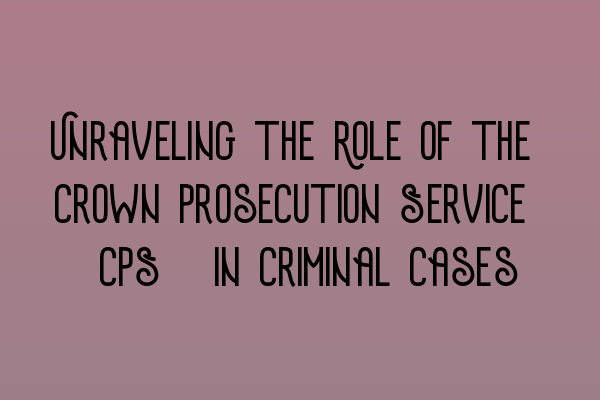Unraveling the Role of the Crown Prosecution Service (CPS) in Criminal Cases
When it comes to criminal cases in the UK, it is essential to have a clear understanding of the role of the Crown Prosecution Service (CPS). The CPS plays a crucial part in the criminal justice system, ensuring that cases are prosecuted effectively and fairly.
At SQE Criminal Law & Practice Law UK, we are committed to providing expert guidance on all aspects of criminal law, including the role of the CPS. In this blog post, we will unravel the intricacies of the CPS and shed light on its significance in criminal cases. We will also explore how the CPS functions, its responsibilities, and its impact on the outcomes of criminal trials.
Understanding the Role of the CPS
The CPS acts as the prosecutor in criminal cases in England and Wales. Its main role is to review the evidence gathered by the police or other investigating agencies and decide whether there is enough evidence to present a case in court. The CPS is responsible for making fair and impartial decisions on whether someone should be charged with a criminal offense and, if so, what the charges should be.
The CPS also has a duty to ensure that the criminal justice system operates effectively and efficiently. It works closely with the police, witnesses, and victims to gather all the necessary evidence and build a strong case. In addition, the CPS provides legal advice to the police during the investigation process, assisting them with various legal matters.
One of the key functions of the CPS is to present cases in court on behalf of the prosecution. It is the job of the CPS to present the evidence and arguments, cross-examine witnesses and experts, and make sure that the trial is conducted fairly and in accordance with the law.
The Impact of the CPS on Criminal Trials
The CPS plays a crucial role in determining the outcome of criminal trials. Its decisions on whether to charge an individual, the nature of the charges, and the evidence presented can significantly affect the course of a trial. It is the responsibility of the CPS to ensure that justice is served by presenting a strong and effective case.
In some cases, the CPS may decide that there is insufficient evidence to proceed with a prosecution. This decision may lead to the case being dropped, and the accused individual being released without charges. On the other hand, if the evidence is sufficient, the CPS will proceed with the prosecution and present the case in court.
Throughout the trial, the CPS must present the evidence in a clear and persuasive manner. Its legal professionals are trained to analyze and interpret complex legal and factual issues, ensuring that the case is presented with precision and effectiveness. The CPS also has a duty to disclose all relevant evidence to the defense, ensuring a fair trial.
Conclusion
The role of the Crown Prosecution Service in criminal cases is vital for the effective functioning of the criminal justice system. Working closely with the police and other agencies, the CPS ensures that cases are prosecuted fairly and in accordance with the law.
If you require legal representation in criminal matters or have any further questions about the CPS and its role, our team at SQE Criminal Law & Practice Law UK is ready to assist you. Contact us today to schedule a consultation.
Related Articles:
- Legal Representation for Delaware LLCs in the UK: Expert Advice
- Ensuring Ethical Business Practices: Delaware’s Code of Conduct
- Legal Challenges for UK Businesses in the U.S.: Strategies for Overcoming Hurdles
- UK Criminal Law: An In-Depth Analysis of the British Legal System
- Legal Challenges for UK Businesses in the U.S.: Strategies for Overcoming Hurdles
